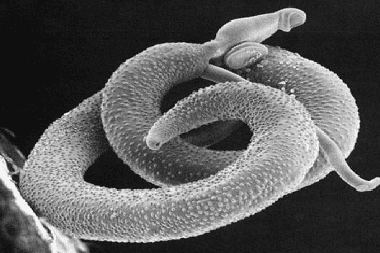Parasitic diseases >>>> Who are the alveococci?
Who are the alveococci?

Alveococcus is a type of parasitic worm, a relative of echinococcus. A similar structure with other types of tapeworms makes it as harmful and dangerous as a helminth, like its counterparts.
In fact, the disease of alveococcosis can be considered fatal if you do not start treatment in the early stages of its development. It gives such an opportunity in the treatment of the slow development of the parasite, which, getting into the body, is attached in the form of a bubble (cyst) and conducts its life by multiplying and adding to the bubble an increasing number of bubbles with alveococcus embryos. Such growth is akin to a cancerous tumor and has similar consequences - the affected organ begins to deteriorate due to damage to the capillaries and the development of parenchymal necrosis.
Infection with alveococci occurs due to their high survival rate in the external environment and entering the gastrointestinal tract, and then into the blood from contaminated eaten foods or dirty hands. Such alveococcus contamination is found in regions with developed animal husbandry (cattle breeding, pig breeding, fur trade and other types of fur farms).
The eggs of the parasite with feces fall on the ground and into the water, and already the next stage on cultivated plants (grasses, shrubs, trees). Poorly washed crop products and close contact with infected animals contributes to the entry of the eggs of the parasite into the human intestine, and then into organs such as the liver, kidneys, and heart. Inhaling dust containing helminth eggs, you can infect the alveococcus and the respiratory tract, but most often microscopic eggs are spread throughout the body with the blood stream.
Treatment of alveococcosis is similar to that of echinococcosis. Antiparasitic drugs are used and, if necessary, surgical treatment - capsules with embryos are excised.

Read

Read



























